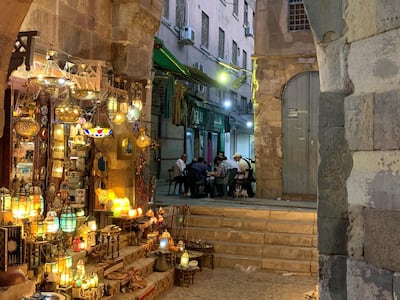Thousands of Egyptians have flocked to Cairo’s Islamic quarter during Ramadan, defying government advice on social-distancing to break their Ramadan fast among some of the city's historic treasures.
Hundreds of years of Egyptian history is concentrated in the area, which is a Unesco world heritage site with a wealth of historical sites from the Fatimid, Mameluke and Ottoman eras.
Breaking the day’s fast in the Islamic quarter during Ramadan has become a firmly rooted tradition.
It was inspired largely by the atmosphere of spirituality created by the area’s multitude of mosques, including the 1,000-year-old Al Azhar Mosque, and by the colours and smells of the Khan El Khalili bazaar.
Popular tea houses and markets, selling goods ranging from food and spices to gold jewellery, cater for the crowds that throng the area.
On the day The National visited, only a tiny minority of people appeared to be following the government's advice on wearing masks and social distancing.
A third wave of the pandemic has continued to hit Egypt hard, with infection rates and the country’s coronavirus death toll rising rapidly.
But revellers squatted shoulder to shoulder on pavements to eat their iftar meal as an eerie silence descended over the district.
Shortly after sunset, the place began to resemble a country fair, with more people arriving, hawkers selling toys and balloons and oud players roaming the tea houses to serenade patrons with Arabic classics in exchange for money.
Fahd Hassan, 46, an office worker from Cairo's overcrowded Imbabah area, went to the area with his wife and two children, hauling a large bag filled with food, a plastic bottle of sweet hibiscus and a flask of strong black tea.
The family squatted on a part of the pavement next to a small patch of grass guarded by policemen, who stopped anyone from entering.
All four members of the family wore face masks under their chins.
"It's in God's hands whether we catch corona or not," Mr Hassan said. "Masks make us very uncomfortable but we will place them on our noses when we are done with iftar."
Overhearing the conversation, a middle-aged woman nearby chipped in: "Leave it to the Almighty. We are all at his mercy."
While eating iftar in the Islamic quarter is a custom mostly for poor and middle-class Egyptians, those with bigger wallets flock to the district’s cafes, restaurants and Ramadan marquees, where live music is played and food is served.
Egyptians have largely ignored preventive measures since the coronavirus pandemic arrived in the country of 100 million people 14 months ago.
A lockdown introduced between March and July last year, which included a night-time curfew, forced cafes and restaurants to close and suspended international air travel was able to ease the outbreak.
But this year, the government decided against another lockdown to try to avoid an economic meltdown and stop millions of day workers and their families from going hungry.
Instead, the Egyptian health authorities are stressing preventive measures and pinning hopes on the vaccination campaign.
The vaccine programme began in January but got off to a slow start. Less than 1 per cent of the population has been vaccinated to date.

The combination of lax adherence to government guidelines and the slow pace of vaccination is costing lives.
“It’s getting worse every day,” Mohammed El Nady, a member of the government’s Anti-Corona Scientific Committee, said in a scathing TV interview this week.
“The coronavirus today is like a beast that’s growing bigger, eating everything around it.
"In response, we are being lax, not looking ahead; being irresponsible and not realising that a disaster is upon us."
Health Minister Hala Zayed said the rate of infection in the week ending April 30 was five times higher than in the same week last year.
But other health officials said the third wave of the outbreak could peak in the next 10 to 14 days.
“Preventive measures are the backbone and first line of defence against this virus,” said Mohammed Tageldeen, President Abdel Fattah El Sisi’s health adviser.

“The rate of infection rises every day and will continue to do that until it peaks, plateaus and then starts to drop."
Mr Tageldeen’s prediction has so far been borne out by health ministry figures.
The ministry on Monday reported more than 1,000 new infections for a seventh consecutive day, a significant rise after weeks in which cases hovered around 600 to 700.
Daily deaths have ranged between 50 and 60 in the last week.
More than 230,000 cases of Covid-19 have now been recorded in Egypt since the outbreak began, with 13,531 deaths.
These figures are widely thought to be reliable indicators of the curve of infections, but the true numbers of cases and deaths are believed to be much higher because of limited testing.
Many cases have also been treated outside the state health system.


